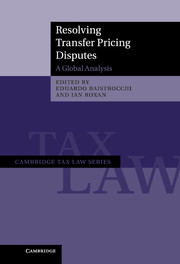Book contents
- Frontmatter
- Contents
- List of figures
- List of tables
- List of contributors
- Acknowledgements
- The Golden Bridge: analytical table of cases by topics in the OECD Guidelines
- Table of Cases
- Abbreviations
- Part I The context of transfer pricing disputes
- Part II North America and Europe
- Part III Asia Pacific
- 9 Transfer pricing disputes in Australia
- 10 Transfer pricing disputes in Japan
- 11 Transfer pricing disputes in the Republic of Korea
- 12 Transfer pricing disputes in Singapore
- Part IV BRIC Countries
- Part V South America, Middle East and Africa
- Part VI Conclusion
- Index
- References
9 - Transfer pricing disputes in Australia
from Part III - Asia Pacific
Published online by Cambridge University Press: 05 November 2014
- Frontmatter
- Contents
- List of figures
- List of tables
- List of contributors
- Acknowledgements
- The Golden Bridge: analytical table of cases by topics in the OECD Guidelines
- Table of Cases
- Abbreviations
- Part I The context of transfer pricing disputes
- Part II North America and Europe
- Part III Asia Pacific
- 9 Transfer pricing disputes in Australia
- 10 Transfer pricing disputes in Japan
- 11 Transfer pricing disputes in the Republic of Korea
- 12 Transfer pricing disputes in Singapore
- Part IV BRIC Countries
- Part V South America, Middle East and Africa
- Part VI Conclusion
- Index
- References
Summary
Australia has a relatively long history in adopting and applying transfer pricing rules. Australia introduced a transfer pricing rule early on and there were some lengthy tribunal decisions in the area in the 1950s and 1960s. More recently, Australia has devoted significant resources to transfer pricing issues, including at the Organisation for Economic Co-operation and Development (OECD) level and in domestic development of administrative guidance and enforcement by the Australian Taxation Office (ATO).
Considerable controversy has attended this activity and led to a number of disputes and cases which have reached the public arena. The ATO has largely been unsuccessful on substantive transfer pricing issues in litigation (which is likely to lead to law changes) but successful in matters of procedure (leading to settlement of disputes after taxpayers lost the procedural contest). In addition the ATO has a large advanced pricing arrangements (APAs) programme and is actively involved in the mutual agreement procedure (MAP) on transfer pricing matters but otherwise does not seem to have a specially developed dispute resolution procedure for transfer pricing.
- Type
- Chapter
- Information
- Resolving Transfer Pricing DisputesA Global Analysis, pp. 359 - 414Publisher: Cambridge University PressPrint publication year: 2012
References
- 1
- Cited by



